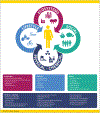The exposome and health: Where chemistry meets biology
- PMID: 31974245
- PMCID: PMC7227413
- DOI: 10.1126/science.aay3164
The exposome and health: Where chemistry meets biology
Abstract
Despite extensive evidence showing that exposure to specific chemicals can lead to disease, current research approaches and regulatory policies fail to address the chemical complexity of our world. To safeguard current and future generations from the increasing number of chemicals polluting our environment, a systematic and agnostic approach is needed. The "exposome" concept strives to capture the diversity and range of exposures to synthetic chemicals, dietary constituents, psychosocial stressors, and physical factors, as well as their corresponding biological responses. Technological advances such as high-resolution mass spectrometry and network science have allowed us to take the first steps toward a comprehensive assessment of the exposome. Given the increased recognition of the dominant role that nongenetic factors play in disease, an effort to characterize the exposome at a scale comparable to that of the human genome is warranted.
Copyright © 2020, American Association for the Advancement of Science.
Conflict of interest statement
Figures



References
-
- Wild CP, Complementing the genome with an “exposome”: the outstanding challenge of environmental exposure measurement in molecular epidemiology. Cancer Epidemiol Biomarkers Prev 14, 1847–1850 (2005). - PubMed
-
- Ioannidis JP, Loy EY, Poulton R, Chia KS, Researching genetic versus nongenetic determinants of disease: a comparison and proposed unification. Sci Transl Med 1, 7ps8 (2009). - PubMed
-
- Global Burden of Disease Study Group, Global, regional, and national comparative risk assessment of 84 behavioural, environmental and occupational, and metabolic risks or clusters of risks, 1990–2016: a systematic analysis for the Global Burden of Disease Study 2016. Lancet 390, 1345–1422 (2017). - PMC - PubMed
-
- Landrigan PJ et al., The Lancet Commission on pollution and health. Lancet 391, 462–512 (2018). - PubMed
Publication types
MeSH terms
Substances
Grants and funding
LinkOut - more resources
Full Text Sources

